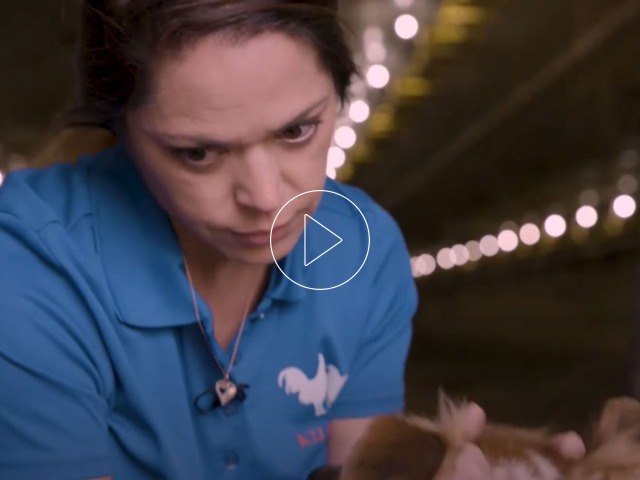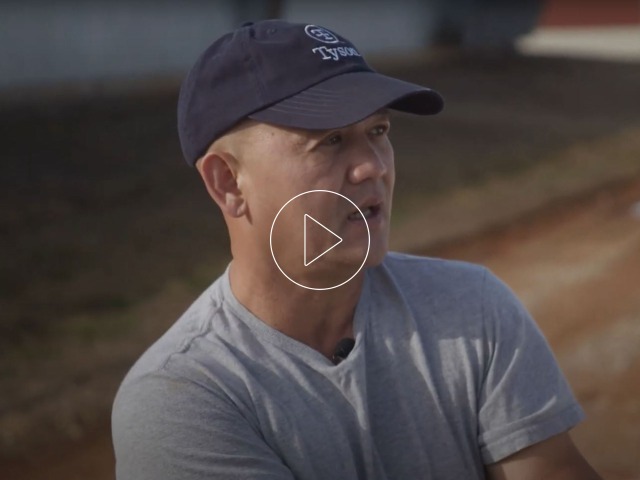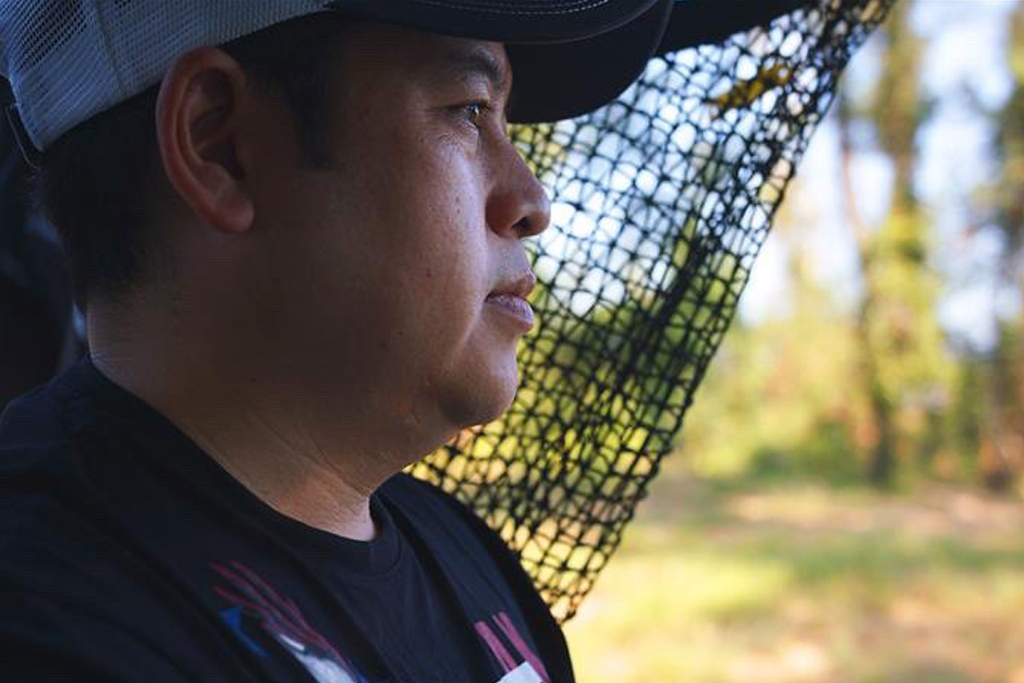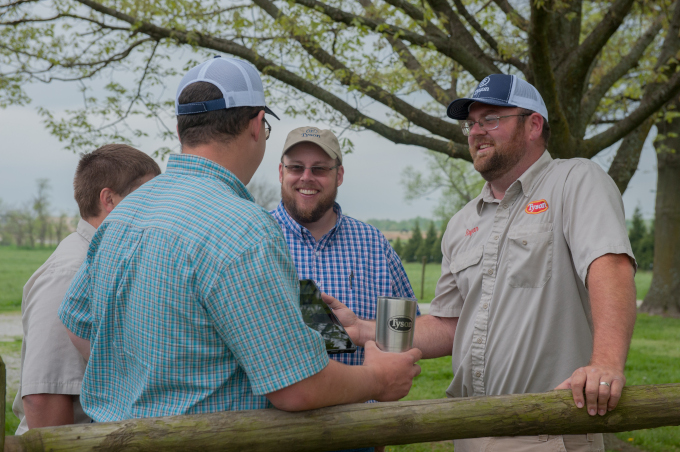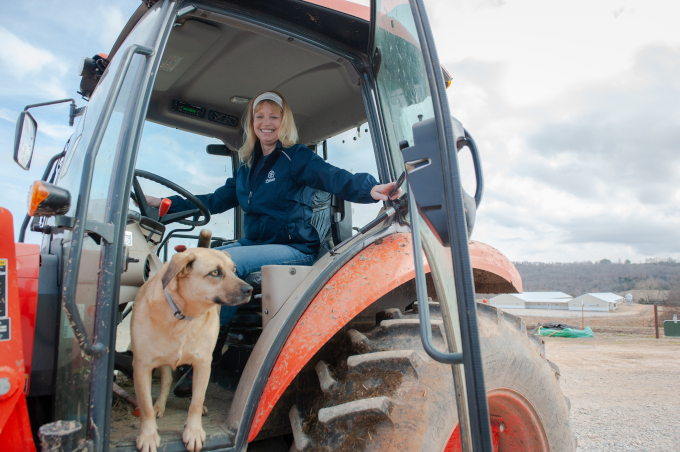Feeding the World with America’s Poultry Farmers
Tyson Foods began as a chicken business, nearly 90 years ago, and today, we are one of the leading supporters of U.S. poultry farmers. We depend on our network of small and independent farmers to supply our plants – and we only succeed when they also succeed.
We have been working with poultry farmers on a contractual basis since the late 1940s. We supply the birds and feed, as well as technical expertise, while the poultry farmer provides the labor, housing and utilities to support the birds. This benefits the farmers because it insulates the farmer from the risk of changing market prices for chicken and feed ingredients such as corn and soybean meal, which represents most of the cost of raising a chicken. So, farmers’ compensation is not dependent on what the feed costs or prices at the grocery store. This benefits American consumers because the incentive-based pay system helps keep the price of nutritious chicken affordable for millions of families and the foodservice industry.
This system has been successfully helping feed America – and the world – for nearly a century. Today, as demand for chicken goes up, it is to our benefit to help all of our partner farmers deliver healthy birds to help meet this demand. When they succeed, our own business does better. In fact, a 2022 study by Agriculture Economist, Dr. Thomas Elam found that the median income of contract poultry farmers was significantly higher than both all farm households and all U.S. households.
Today, we pay nearly $820 million annually to the more than 3,600 poultry farmers who contract with us. Traditionally, companies like Tyson provide incentives to farmers to deliver safer, healthier and better quality chickens: while every farmer gets paid a base rate, farmers who deliver birds above the average standard can receive a bonus that’s based off a points system. Simply put, Tyson pays more for better performance – a concept shared across many industries.
However, we recognize there are other ways to incentivize performance, and so we’ve been piloting different types of payment systems. For example, at our Humboldt, Tennessee facility, farmers get a base rate depending on the size of their poultry barns. They can also receive bonuses depending on the quality and efficiency of their flock.
Respecting our Partners
We respect and value the contribution of the farmers we work with, and have detailed guidance for our relationship in the Tyson Foods’ Contract Poultry Farmers’ Bill of Rights, which we launched in in 2018. Highlights include farmers’ right to:
• Information detailing how much they are paid.
• Discuss their contract with outside parties, including legal counsel.
• A fixed length contract that can only be terminated for cause.
• Join an association of contract poultry farmers.
• Industry leading poultry welfare standards and training on those standards.
We also established a Contract Poultry Farmer Advisory Council so we could have open, transparent communications between poultry farmers and Tyson. One of the outcomes of this council was the creation of an app that gives farmers access to real time information on when the company will deliver chicks from the hatchery or feed to their farms, allowing them time to properly prepare their facilities for the birds.
Vinh and Jeremy - A Family Farm
We proudly work with thousands of independent poultry farmers across the country every day, bringing quality protein from family farms to family tables. Some families, like Jeremy and Vinh’s, have been raising chickens for us for generations. For them, it's more than just a reputation; it's about producing good, quality product for the consumer. And Vinh says farming is one of the best decisions he’s made!
William and Leah - Feeding the World
William and his wife Leah grew up farming. They know the value of hard work and wanted to pass that on to their kids. Leah is thankful for their working relationship with Tyson and the service techs that assist them daily. For them, farming is a source of pride – a labor of love to help feed the world.
Doug and June - Dedicated to Quality
Meet Doug and June, a family that has put their heart and soul into farming for over 40 years. Doug says he’s proud to be a poultry farmer for Tyson Foods, a name that represents fair, competitive pay, animal welfare standards and everyone working together to ensure a quality product.
American Made: Is Tyson Chicken Produced in the USA?
Meet Bill and Jeff. Bill is a Truck Driver for Tyson Foods and Jeff is a poultry farmer. They’ve been friends for 5 decades. They grew up together and spent their whole life in the same community. Jeff is thankful for the oversight, technology and advancements in the American farming industry. As Jeff says, farmers are important and he’s built something pretty special.
We’re Committed – Grant
Farmer Grant is looking forward to passing down his farm to his son. Poultry farming has made his diversified operation financially stable enough to do that. He believes you get out of it what you put into it with poultry farming. He takes good care of his chickens and he sees the results when he sells them. He takes pride in feeding the world. He knows chicken doesn’t just come from grocery stores, it comes from farms.
The practice of farmers raising chickens under contract for poultry processing companies has been around since the 1930s and is the industry standard. Tyson Foods has been working with poultry farmers on a contract basis since the late 1940s and it’s been a relationship we believe works well for both the farmer and the company. We supply the birds and feed, and provide technical advice, while the poultry farmer provides the labor, housing and utilities. This cooperation between Tyson Foods and family farms increases efficiency and quality, while maintaining affordable prices for consumers.
The average farmer has been raising chickens for Tyson Foods for 17 years. Some farm families have been raising chickens for us for three generations.
Contract farming insulates the farmer from the risk of changing market prices for chicken and feed ingredients such as corn and soybean meal, which represents the majority of the cost of raising chicken. So, farmers’ compensation is not dependent on what the feed costs or prices at the grocery store.
The average contract poultry farmer has been raising chickens for Tyson Foods for nearly 17 years. Nearly 30% of our contract poultry farmers have been raising birds for us for three generations, speaking to the strength of the relationship with Tyson. And we often receive inquiries from other famers, also interested in raising chickens for us.
The average contract we have with our poultry farmers is for 10 years.
We use a performance-based incentive system that rewards poultry farmers for raising high quality birds. The details are outlined in the written contracts with the farms. All farmers get paid a minimum base rate for the chickens they raise and can also earn a premium for bird quality. The incentive system rewards poultry farmers who safely and effectively raise chickens that meet our customers’ demands – while meeting all standards of animal welfare.
The payment formula includes such factors as the number of birds, amount of feed used, the performance of their flock compared to those raised by other contract farmers and the weight of the birds delivered to the processing plant.
No. It’s used by many poultry processing companies in the U.S to determine farmer compensation and keep nutritious chicken affordable for millions of American families and restaurants.
Income from chicken farming varies and depends on a number of factors. For some farmers, it’s a sole source of income. For many, it’s supplemental income to another job or the raising of crops or other livestock. In fact, a 2022 study by Agriculture Economist, Dr. Thomas Elam found that the median income of contract poultry farmers was significantly higher than both all farm households and all U.S. households. The farmers we work with are also paid in a timely manner—receiving their first payment promptly before the close of the 15th day following the week in which they were delivered to the plant.
The poultry processor-broiler chicken farmer relationship is extensively regulated by federal law. For example, by law farmers are entitled to:
- A written copy of their contract with the poultry company.
- Information detailing how much they are paid.
- Information explaining how a contract can be cancelled.
- Right to a 90-day written notice of the processor’s intention to terminate the contract.
- Right to terminate the contract with the processor by giving a 90-day written notice.
- Right to discuss their contract with outside parties.
- Right to join an association of farmers.
Chicken farming is like any other business; people often have to borrow some money to start, improve or expand their operations. Each of our contract chicken farmers must decide on their own the size and scope of their operations and how much debt they are willing to take on.
Other than improvements, maintenance, or repairs to address animal well-being issues, we do not require equipment or housing specification upgrades in the middle of contracts. In recent years, the technology to modernize chicken housing has become more widely used in the industry and benefits are better known, so we require farmers to meet a set of housing specifications that are outlined in the contracts. The benefits of more modern housing include a more comfortable living environment for the birds with improved ventilation and more uniform temperatures through the barn. It also saves energy to heat and cool the house which is a savings for the farmer.
We work closely with our farmers, including regular visits from our service technicians to provide support and technical expertise. In fact, we invest more than $30 million every year to help small, independent farmers implement agricultural best practices, including animal welfare. If a farmer is not performing well, we have a program in place designed to help get them, and their small business, back on track.
All farmers who grow chickens for Tyson Foods have rights, which are part of their contract. The rights are outlined in the CONTRACT POULTRY FARMERS’ BILL OF RIGHTS.
At facilities like Humboldt, Tennessee, farmers get a base rate depending on the size of their poultry operation. They can also receive bonuses depending on the quality and efficiency of their flock.
Additional Resources
A Birds Eye View of How Chicken Farmers Are Paid:
This structure – based on the most fundamental elements of any business atmosphere – is the best way to ensure that chicken farmers are rewarded for producing quality chickens in an environmentally sustainable way. It also ensures that the welfare of the birds is the farmers’ top priority.
Building A Future in Rural Arkansas: A Tyson Farmer Story
by Cheyenne Autry Striefler
When Alex, our videographer, and I got to Brian’s house in Arkansas, he pulled out mugs and started heating up water for tea. He said he had coffee, too, if we preferred, and his wife Lisa would soon be back with breakfast. The sun had just come up.
Brian had already done his morning checks at the chicken houses while Lisa took their three daughters to school. Their youngest, Victoria, was starting kindergarten and nervous about her first day. Lisa later told me over sausage rolls and donuts how Victoria had changed her dress three times that morning.
Committed to Enhancing Communications with Poultry Farmers
by Doug Ramsey
As part of our journey to continually live our purpose, we’re launching several initiatives aimed at enhancing communications and transparency with the thousands of independent farmers who grow chickens for our company.
Yesterday we mailed every farmer a copy of the CONTRACT POULTRY FARMERS’ BILL OF RIGHTS along with a note explaining that we’re developing an advisory council made up of farmers and we’ll be investing in new communications technology with our growers in mind.
From Farm to Family Table: Butler and Geurin Family Farms
by Morgan Watchous
Family farms are more than a business, they are a livelihood, and they are raising the next generation of farmers.
To learn more about how the families we work with operate, we sat down with the Butlers and Geurins–two families who have owned and operated their own family farms for multiple generations in Northwest Arkansas.
From Farm to Family Table: Stoni Jo, Poultry Breeder
by Morgan Watchous
Where does the food we put on our family tables come from? Who grows, harvests and prepares it for us?
More of today’s consumers want to know the story behind our food. Beginning at the farm and emerging as a culinary creation on our tables, there’s a journey to maintaining a robust and sustainable food system. To dive deeper into the story, we sat down with poultry farmer Stoni Jo, whose family-owned farm contracts with Tyson Foods, to hear how her role as a poultry breeder contributes to the food system–and how she plays a fundamental role in preparing good food for family tables.
Additional Resources
- TYSON FOODS’ FARMERS PAGE
- CHICKENCHECK.IN – AN INDUSTRY SOURCE
- A DAY IN THE LIFE OF A CHICKEN
- Contract Poultry Farmers’ Bill of Rights
- Poultry Farmer Advisory Council
- www.FarmWithTyson.com
- FarmCheck® Program
- What is a contract grower? How and why do farmers and chicken companies partner to raise chickens?

